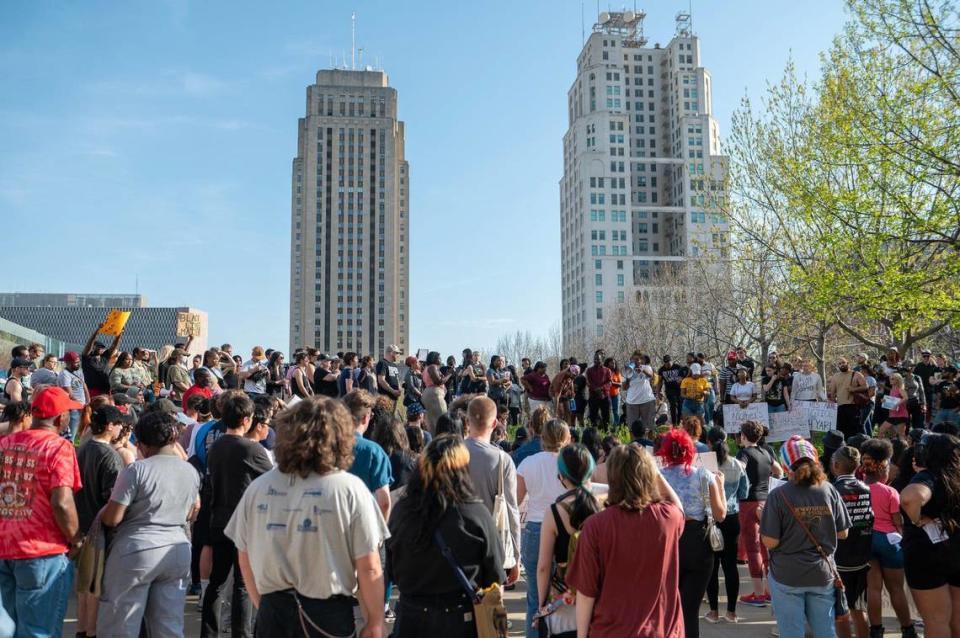Release of man charged with shooting Ralph Yarl prompts calls for bail reform. Here’s why
After Andrew Lester — the 84-year-old white man charged with shooting a Black teenager twice on his Northland Kansas City doorstep — surrendered to the Clay County jail last month, he paid $20,000 and was released within the same afternoon.
Lester will not need to wait in custody before his June court date, despite facing two felony charges for the shooting of 16-year-old Ralph Yarl in April, because he had the means to post bail. On Monday, his attorney also filed to have his case sealed until trial to limit publicity.
Yarl is recovering at home, and his family says he is looking to move forward with his life after he was shot in the head after mistakenly ringing the doorbell of the wrong house when trying to pick up his younger brothers.
Local advocates are pointing to Lester’s release — while the vast majority of people in jail in Clay County are there awaiting trial — as evidence of what they describe as needed reforms to Missouri’s cash-bail system. If someone can’t afford bail, even if their charge was less severe than Lester’s, they often have to stay in jail until trial.
“It’s a very nuanced case of Andrew Lester being able to just pay his way out of harm,” said Amaia Cook, co-founder of local activist group Decarcerate KC. “Cash bail is not just something that speaks to someone’s financial status, but it’s a system that upholds racism and upholds white supremacy.”
Janet Smith, a spokesperson for Kansas City Community Bail Fund, called cash bail the “criminalization of being poor.”
Longtime critics of cash bail in Missouri and around the country say the practice inflates jail populations and results in two different justice systems divided along class lines.
Here’s a breakdown of how the bail system works in Missouri, and how the shooting of Ralph Yarl connects to things some critics want to see change.

First thing’s first, what exactly is bail?
Until trial, Lester (and every other defendant in Missouri and around the country) is still legally considered innocent.
“So the bond is not meant to be a punishment,” said Kansas City defense attorney Tracy Spradlin. “It’s there to ensure that he shows up to court.”
Spradlin said bail is supposed to be a way to maintain a defendant’s right to freedom before conviction, while also ensuring that they appear for their proceedings.
Lester paid 10% of his $200,000 bail as a promise to the county that he will attend his hearing next month. In addition to the cash, his release came with the conditions that he needs to check in with a supervisor from the court once a month, cannot have any weapons at his residence, cannot contact Yarl’s family and cannot leave the state before trial.
In Missouri, a defendant must go to court within 48 hours of being arrested so a judge can decide what kind of bail — either money or other conditions — the defendant needs to meet in order to be released before trial. This rule was put in place by Missouri’s 2019 Money Bail Reform Act, which changed how the state decides when and if someone should be detained.
Missouri’s Supreme Court sets the rules around bail and gives judges a few options:
Monetary bonds: A judge can set an amount of money that the defendant must pay to be released from jail before trial. If the defendant shows up to all the court proceedings, the bail amount is returned when the case is closed.
Non-monetary bonds: Instead of money, a judge can require a defendant’s signature or hold the defendant’s driver’s license until trial. Judges can also place restrictions on travel, order house arrest or require regular check-ins with an officer of the court until trial.
No bond: In particularly serious cases, a judge can decide that no combination of money or non-monetary conditions will “secure the safety of the community,” and can order the defendant to stay in jail until trial.
If the court does set a money bond for a defendant, but that person doesn’t have the means to pay it, the defendant will remain in jail until trial. The only other option is to request a bail review, which could lower the bail amount, according to Spradlin.
How is bail decided in Missouri?
The most recent guidelines for bail encourage Missouri judges to use the “least restrictive option” to make sure the defendant shows up to court and to guarantee the safety of the community or other people involved in the case.
“It’s very subjective, and it’s based on the circumstances of the case, and the person’s criminal history, the severity of the charge,” Spradlin said.
According to the state’s rules, this means a judge is supposed to consider the defendant’s ability to pay when deciding on a monetary bond.
The courts are also supposed to consider the nature of the violations that the defendant is accused of, the defendant’s mental health and other personal circumstances, such as whether the person has failed to appear in court in the past and other past convictions.
How is that shaking out?
In effect, judges have a lot of discretion when it comes to who gets bail set and who gets other pretrial options.
The Star has previously reported that Kansas City area courts have continued to rely heavily on money bail, even with the 2019 rules in place.
“They had little to no impact on equalizing cash bail in Missouri,” Smith said.
“Judges across the state are not using it to let people out of jail,” said Dylan Pyles, the other co-founder of Decarcerate KC. “They’re basically maintaining the status quo that was already kind of happening.”

How common is it to post bail?
While Lester’s bail amount was standard for the charges he’s facing, his experience of being able to afford paying a fee that steep to be released is not the norm.
In the same county as Lester, a man died in jail earlier this year after being arrested for falling behind on his $50 child support payments. He couldn’t afford the $10,000 bail.
As of this week, about 94% of the people in custody at the Clay County Detention Center, where Lester was released from, were awaiting trial and have not yet been convicted of a crime or sentenced. Some people have been there for months or even years before trial, according to county data.
Comparable real-time numbers weren’t immediately available for Jackson County, but the county has reported that typically 83% of those jailed at the Jackson County Detention Center are still awaiting trial.
Across the country, more than two-thirds of the jail population is made up of those who can’t afford bail, according to research from the University of Missouri School of Law.
What are advocates’ biggest concerns with cash bail?
According to a report published by the University of Missouri School of Law in 2020, the majority of people who are impacted by the state’s bail system are poor.
Many low-income and poor defendants also don’t have legal counsel at the time that bail is set because of Missouri’s overwhelmed, strained public defense system, according to the report, which lowers their chances of being released or having their bail amount reduced.
“Cageing poor people increases unemployment, puts defendants’ health at risk, and ultimately uses the taxpayer money to do so,” Smith said.
The bail system is also 3.6% more likely to assign high bail amounts to Black defendants in comparison to white ones, according to the Center for American Process.
Smith said that Black and Hispanic applicants seeking bail assistance from the Kansas City Community Bail fund routinely report higher bail amounts compared to white applicants.
“The cash bail situation with Andrew Lester is part of the proof that this justice system is actually set up specifically to disenfranchise and harm poor communities, Black communities, and keep them in a cycle of oppressive systems,” Pyles said.
Higher bail amounts can lead to longer time spent in jail and a higher chance of being sentenced to incarceration, since people in jail experience more challenges when trying to participate in their legal defense, according to the Pretrial Justice Institute, a national advocacy group committed to pretrial system reform.
“When too many people are jailed pretrial, it undercuts that presumption of innocence,” Phil Telfeyan, executive director of Equal Justice Under Law, told The Star in 2020. “It takes away what most Americans feel is fundamental to our justice system.”
What would bail reform look like?
Some bail reformists like Decarcerate KC would like courts to get rid of the bail bond system completely.
“We imagine a world where cash bail as a practice is actually eliminated entirely,” Pyles said.
Others would like states to rethink when and how they set bail for defendants to be based more on risk than on financial status.
“We need clear lines that establish which charges deem a defendant a true threat to public safety and which charges do not,” Smith said.
“The decision to hold someone based on their ability to pay for their freedom cannot be a guess by a human being with bias or an algorithm that was created by a human being with bias.”
In 2022, Illinois became the first state to eliminate cash bonds, so only people who are deemed a flight risk or a threat to the community can be detained, 19th News reported. The state’s Safe-T Act went into effect in January 2023, so it’s still a bit soon to see how well the new system will work.
In places that have eased their cash bail systems by relying less on cash bail, there have been some changes. The Center for American Progress reported that after reforms were passed in places like New Mexico and Washington state, more people were able to complete their pretrial process without getting a new arrest.
The think tank also found that by eliminating cash bail for lower level, non-violent crimes, it reduces the ability for judges to perpetuate racial and economic disparities among defendants.
Nationwide, bail reform is still heavily criticized by many Republicans that feel like the bail system should be stricter. Some have claimed that the system helps with public safety and prevents people from committing new crimes.

